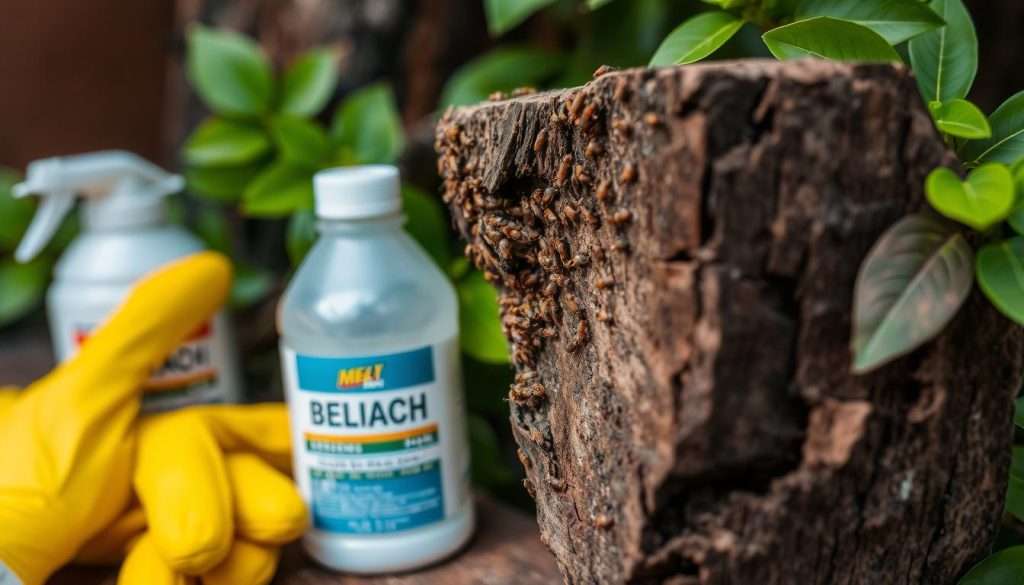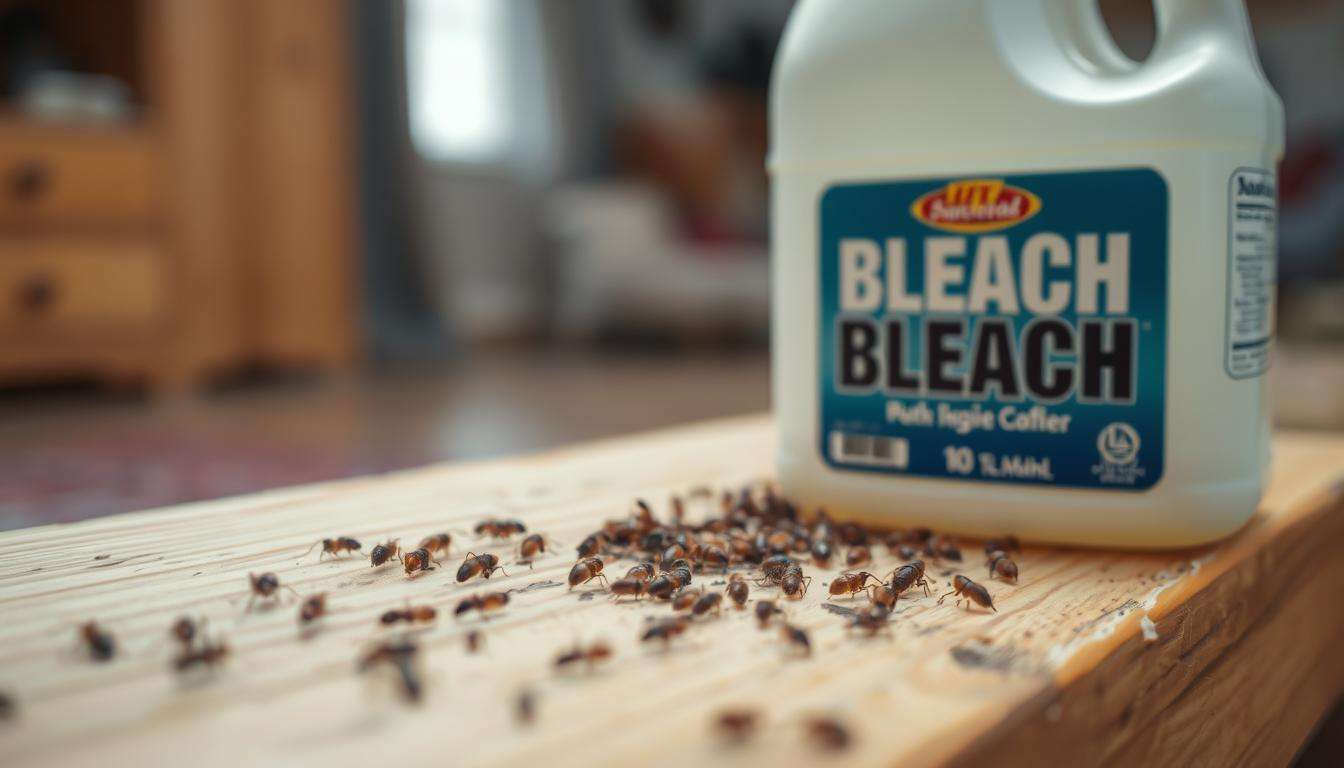Many homeowners think bleach can kill termites. They see it as a quick fix before calling experts. But, it’s important to know bleach’s limits against termites.
Bleach can kill termites it touches. But, it can’t reach termites hiding in walls or floors. Also, bleach can release harmful fumes. This is bad for people and pets.
We’ll look at bleach’s effect on termites, its limits, and better ways to fight termites.
Key Takeaways
- Bleach can kill visible termites but won’t eliminate entire colonies.
- Using bleach releases harmful fumes that can be dangerous for humans and pets.
- Relying on bleach as a primary remedy for termite infestations can lead to dangerous assumptions.
- Professional extermination services are necessary for hidden infestations.
- Alternative methods include natural repellents and preventative measures that are more effective.
Understanding Termites and Their Destructive Impact
Termites are tiny but very harmful to homes. They live in huge colonies with many members. They have a special social structure with workers, soldiers, and reproductives.
This structure helps them work together to damage wooden structures. It’s important for homeowners to know about termite infestations to protect their homes.
The Nature of Termite Infestations
Subterranean termites are the worst for causing damage. They live underground and use mud tubes to get to food above ground. They are hard to spot until they have done a lot of damage.
Drywood termites live in the wood they eat. They are hard to find because they don’t need soil. Dampwood termites like moist wood and are common in humid places.
How Termites Damage Your Home
Termites eat wood from the inside out. This leaves only a thin layer of wood left. Their damage can cost a lot to fix and lower your home’s value.
Look for mud tubes, visible damage, and frass (termite droppings) to spot termites. Finding them early can lessen the damage they cause.
Signs of Termite Presence
Finding termites early is key. Here are some signs to look out for:
- Mud tubes on walls or foundations
- Discarded wings near entry points
- Hollowed wood, which sounds different when tapped
- Frass found near wood structures
- Visible damage to wooden structures and furniture
Being quick to act when you see these signs can help lessen termite damage.
Does Bleach Kill Termites?
Many homeowners wonder if bleach can kill termites. Bleach is easy to find and works against many pests. We’ll see how it fights termites in your home.
Bleach’s Mechanism Against Insects
Bleach, especially chlorine bleach, messes up the proteins in insects like termites. It gets into their bodies through their exoskeleton. Termites breathe in bleach fumes through tiny holes.
Using bleach can kill termites you see right away. But it’s not good for termites hidden in wood.
Effectiveness of Bleach on Visible Termites
Bleach only kills termites it touches. People use it to kill termites they can see. Brands like Clorox or Great Value are popular choices.
But bleach won’t get rid of all termites. Especially those hiding in walls or other places.

| Method | Effectiveness | Notes |
|---|---|---|
| Bleach | Effective on contact | Does not penetrate wood |
| Borax | Kills within 48 hours | Effective for dehydration |
| Essential Oils | Repellent, not a killer | Works best as a prevention method |
| Diatomaceous Earth | Dehydrates termites | Needs exposure |
| Mouthwash | Effective occasional solution | Evaporates harmlessly |
The Limitations of Using Bleach for Termite Control
Homeowners need to know the limits of bleach for termite control. Bleach can kill termites it touches, but it can’t solve the whole problem. This is because of several reasons.
Poor Penetration of Bleach into Wood
Bleach can’t get deep into wood where termites live. Termites hide in wood or under soil, out of bleach’s reach. This poor penetration means many termites stay alive, keeping infestations going.
Termite colonies have thousands of termites. Bleach can’t kill them all, making it hard to get rid of the problem.
Short-Term Results with Long-Term Risks
Bleach might kill some termites right away, but it doesn’t keep termites away for good. Termite colonies spread far, and bleach can’t reach all of them. It’s not enough to stop termites from coming back.
Using bleach can also be dangerous. It can hurt your lungs and burn your skin. For better results, think about getting help from pest control experts or using termite baits.
| Method | Effectiveness | Risks |
|---|---|---|
| Bleach | Short-term results; poor penetration | Health hazards from fumes; potential wood damage |
| Boiling Water | Effective in limited areas | Can damage lawn; ineffective on whole colony |
| Soapy Water | Suffocates visible insects | Not guaranteed to reach entire colony |
| Professional Treatments | Comprehensive eradication | Ongoing cost; potential disruption |
Alternative Solutions for Termite Extermination
Dealing with termites needs many solutions. Homeowners can choose from professional treatments, natural remedies, and ways to prevent termites. These options help keep homes safe.
Professional Termite Treatment Options
For big termite problems, experts are often the best choice. They use many methods to get rid of termites. Here are a few:
- Liquid termiticides: These chemicals are put in the soil and around wood. They create a barrier that keeps termites away and kills them.
- The Sentricon® baiting system: This method uses bait to attract termites. It targets their queens and kills the colony.
- Fumigation: This is used when all else fails. It seals the house and fills it with gas. This gas kills all termites.
Natural Termite Repellents and Remedies
Some people prefer natural ways to fight termites. These methods can help control termite numbers. Here are a few:
- Essential oils: Oils like clove, orange, and neem can keep termites away. Their strong smells repel them.
- Boric acid: This natural pesticide works by harming termites’ stomachs. It weakens and kills them.
- Beneficial nematodes: These tiny worms attack termites. They are a safe way to control termite numbers.
Preventative Measures to Protect Your Home
Keeping your home safe from termites is key. Here are some ways to do it:
- Check your home often for signs of termites. This can stop big problems.
- Keep your home dry. Fix leaks and make sure water drains away from your house. This keeps termites away.
- Use barriers like metal flashing or mesh screens. These protect wood from termites.

Bleach Safety and Environmental Considerations
Using bleach for termite control needs careful thought. It’s good at killing pests but has health and environmental downsides. Sodium hypochlorite, the scientific name for bleach, is effective but risky.
Health Risks of Using Bleach
Being around bleach can harm people and pets. It can cause:
- Respiratory problems from inhaling fumes.
- Skin irritation from touching it.
- Eye damage from spills.
Those with health issues, kids, or pets should be extra careful. Professional pest control offers safer, effective options.
Environmental Impact of Bleach Use
Bleach’s effects on the environment are big. It can make soil and water toxic. This harms plants and animals, changing ecosystems for the worse.
It also doesn’t just kill termites. It can hurt good bugs too. Before using bleach, think about the risks to health and the planet. There are safer, more effective ways to fight termites. Check out this resource for more info.
Conclusion
Bleach might seem like a fast way to get rid of termites. But it’s not a good long-term fix. It can kill some termites it touches, but it doesn’t find and kill the ones hiding.
Instead, look into professional extermination or natural ways like vinegar, baking soda, and borax. These methods are better at controlling termites. They also keep you and the planet safe.
Knowing what to do is key to protecting your home from termites. Taking action early and using the right methods helps keep your home safe and sound.
